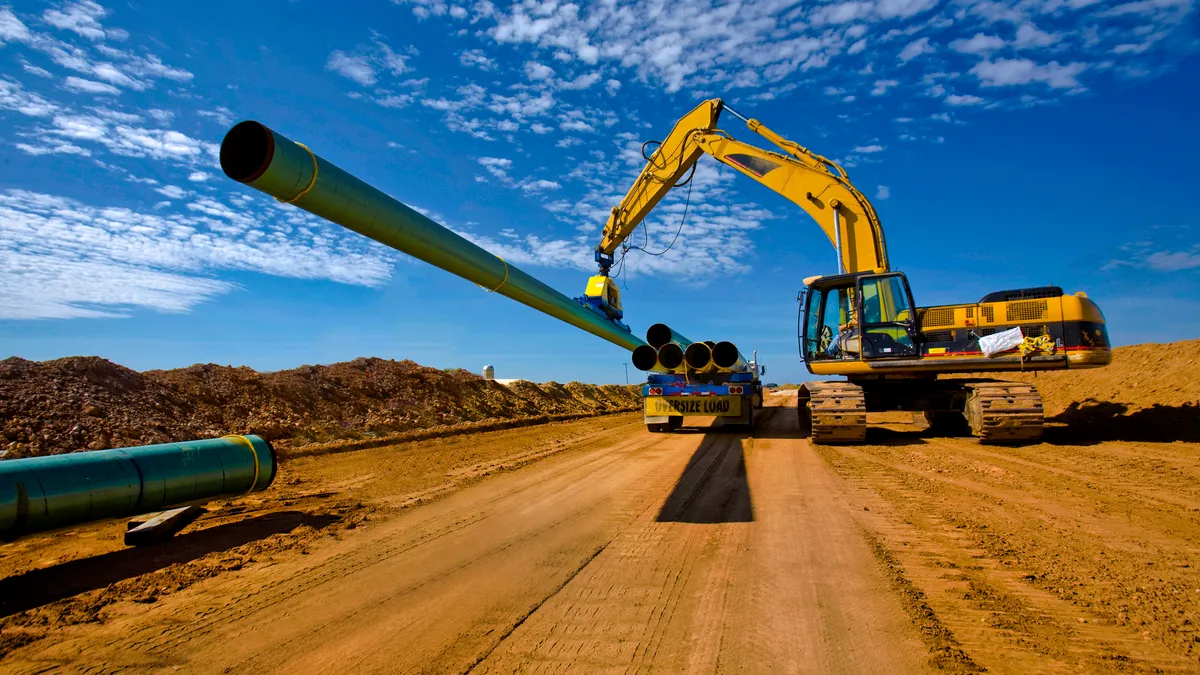Dive Brief:
-
Adding to the string of legal defeats for the Federal Energy Regulatory Commission's natural gas infrastructure reviews, a federal appeals court on Friday said the agency failed to adequately consider downstream greenhouse gas (GHG) emissions when it approved a natural gas pipeline project in Massachusetts.
-
The U.S. Court of Appeals for the District of Columbia Circuit also said it was "troubled" that FERC didn't try to get information to estimate how the Tennessee Gas Pipeline project could increase upstream gas drilling. The court didn't weigh in on the merits of the upstream issue because it wasn't raised during FERC's consideration of the upgrade to Tennessee Gas' existing system.
-
The decision came a day after FERC Chairman Richard Glick defended the agency's new policy for reviewing natural gas projects, including the GHG emissions related to them. Glick told the CERAWeek conference the agency's new review policy will help the commission's decisions survive legal scrutiny.
Dive Insight:
FERC in mid-February adopted a new framework for reviewing natural gas infrastructure proposals that includes expanded criteria for deciding whether the facilities are needed and how they could affect people and the environment.
The framework also includes an interim policy for reviewing a project's potential GHG emissions.
The framework, especially the GHG review criteria, has come under sharp criticism from FERC commissioners James Danly and Mark Christie, some U.S. senators, and the natural gas industry.
In part, the new review criteria are in response to a string of court rulings that found flaws in FERC's natural gas infrastructure reviews, Glick said on Thursday during the CERAWeek conference. Those cases include Sabal Trail, Birckhead, Vecinos and Spire Pipeline. Courts have recently found other federal agencies failed to adequately review projects such as the Mountain Valley Pipeline and Dakota Access oil pipeline.
"The courts send these projects back to the agencies and what that does is it takes years of additional litigation, years of additional review, and it adds hundreds of millions, sometimes billions of dollars of cost," Glick said.
FERC is trying to provide a more legally durable approach through the new review framework, according to Glick.
"Yes, that might require a couple [of] extra months on the front end in terms of a review of the environmental impacts of the project and analyzing the greenhouse gas emissions," Glick said. "But just because we analyze greenhouse gas emissions like we analyze so many other potential environmental impacts for each project, [it] doesn't mean the project is going to get rejected."
In recent meetings with pipeline company executives, Glick said he was told the GHG review framework may be overly vague.
"They expressed a great deal of concern about some of the uncertainties that they suggest that we've raised as a part of these policy statements," Glick said. "I think we need to address some of those uncertainties, provide a little more certainty as to what we mean by some of the provisions in those policies."
FERC is considering ways to speed up the review process for natural gas infrastructure proposals, including hiring more staffers and contractors, Glick said in a letter released Friday to House Energy and Commerce Committee Ranking Member Cathy McMorris Rodgers, R-Wash., and energy subcommittee Ranking Member Fred Upton, R-Mich.
The latest court case — Food & Water Watch and Berkshire Environmental Action Team v. FERC — centered on FERC's review of Tennessee Gas' upgrade project in Agawam, Massachusetts. The project included a 2.1-mile stretch of pipeline and a compressor station.
Then-FERC Commissioner Glick partly dissented from the December 2019 decision approving the project, saying the agency didn't adequately consider the project's climate-related effects.
Citing the Sabal Trail and Birckhead decisions, the D.C. Circuit on Friday said FERC is required to consider a project's indirect effects. The court remanded FERC's decision to the agency and told it to perform a supplemental environmental assessment that must quantify and consider the project's downstream carbon emissions or explain in detail why it cannot do so.
The court's decision isn't an endorsement of the "sweeping" changes contained in FERC's new policy statements, according to the Interstate Natural Gas Association of America (INGAA).
"The court did not suggest that FERC had the authority or the obligation to require mitigation of indirect greenhouse gas emissions," an INGAA spokesperson said in an email, noting the court said the commission could fix its mistakes on remand.
The trade group appreciates Glick's comment at the CERAWeek conference that FERC should address uncertainties related to its new review policies, according to the spokesperson. INGAA would like FERC to clarify that the agency won't reject a natural gas proposal or condition its approval on a pipeline's inability or decision not to mitigate indirect GHG emissions, the spokesperson said. Also, FERC should clarify that it will not consider indirect emissions when evaluating whether a proposed project is in the public interest, according to the spokesperson.
The appeals court decision is another in a line of rulings that FERC needs to consider downstream GHG emissions when reviewing pipeline projects, according to Gillian Giannetti, senior attorney with the Sustainable FERC Project.
"It's this kind of shoddy review that FERC aims to correct with its updated gas policy," Giannetti said in an email. "This is why everyone should be applauding FERC for taking this action and trying to address these emissions: It doesn't benefit anyone – including pipeline developers – for FERC to lose over, and over, and over, on this issue."














